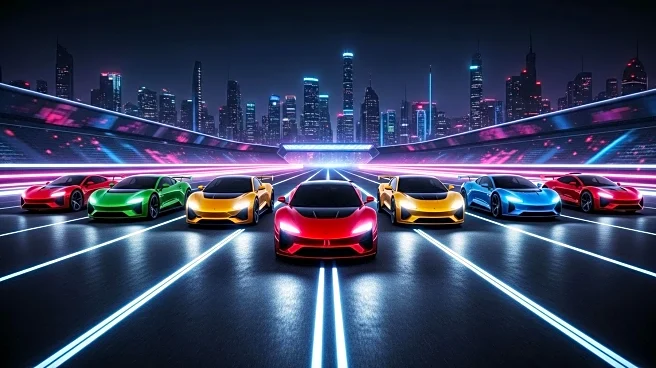What's Happening?
The list of the top 10 quickest electric vehicles (EVs) of 2025 has been released, showcasing the advancements in EV technology and performance. Leading the list is the Aspark Owl, which can accelerate from 0 to 60 mph in just 1.72 seconds. Other notable entries include the Rimac Nevera R and the Pininfarina Battista, both offering impressive speed and horsepower. The Lucid Air Sapphire and Tesla Model S Plaid also feature prominently, demonstrating the growing capabilities of electric sedans. The list highlights the diverse range of EVs available, from hypercars to practical SUVs, each offering unique performance attributes.
Why It's Important?
The unveiling of the quickest EVs of 2025 underscores the rapid evolution of electric vehicle technology, particularly in terms of performance. These advancements are significant for the automotive industry, as they challenge traditional combustion engine vehicles and set new benchmarks for speed and efficiency. The list reflects the increasing consumer demand for high-performance EVs, which could drive further innovation and investment in the sector. Additionally, the focus on speed and acceleration highlights the potential for EVs to dominate the performance car market, influencing consumer preferences and industry trends.
What's Next?
As the EV market continues to grow, manufacturers are likely to focus on enhancing performance while addressing other consumer concerns such as range, charging infrastructure, and affordability. The competition among automakers to produce faster and more efficient EVs will likely intensify, leading to further technological breakthroughs. Regulatory changes and incentives may also play a role in shaping the future of the EV industry, encouraging the adoption of electric vehicles and supporting infrastructure development.
Beyond the Headlines
The emphasis on speed in the EV market may have broader implications for environmental sustainability and urban planning. As EVs become more prevalent, there could be shifts in transportation policies and infrastructure to accommodate electric vehicles. The focus on performance may also influence cultural perceptions of EVs, positioning them as desirable and innovative alternatives to traditional vehicles. Additionally, the advancements in EV technology could spur discussions about the ethical and environmental impacts of high-performance vehicles.









